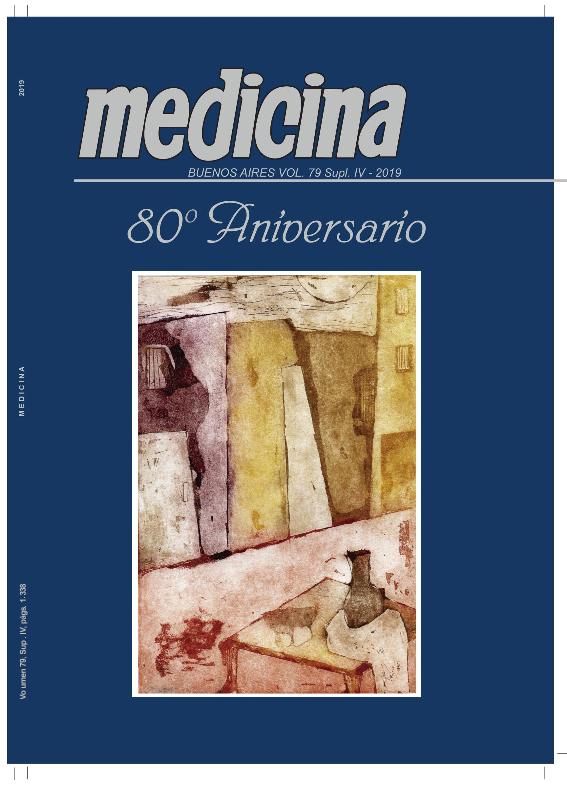Evento
Atrial natriuretic peptide (ANP) enhaces antioxidant capacity in experimental acute pancreatitis
Courreges, Ana Paula ; Alvarez, Guadalupe Inés
; Alvarez, Guadalupe Inés ; Contin, Mario Daniel
; Contin, Mario Daniel ; Ochoa, Federico Claudio; Lairion, Fabiana Norma; Repetto, Marisa Gabriela
; Ochoa, Federico Claudio; Lairion, Fabiana Norma; Repetto, Marisa Gabriela ; Vatta, Marcelo Sergio
; Vatta, Marcelo Sergio ; Bianciotti, Liliana Graciela
; Bianciotti, Liliana Graciela
 ; Alvarez, Guadalupe Inés
; Alvarez, Guadalupe Inés ; Contin, Mario Daniel
; Contin, Mario Daniel ; Ochoa, Federico Claudio; Lairion, Fabiana Norma; Repetto, Marisa Gabriela
; Ochoa, Federico Claudio; Lairion, Fabiana Norma; Repetto, Marisa Gabriela ; Vatta, Marcelo Sergio
; Vatta, Marcelo Sergio ; Bianciotti, Liliana Graciela
; Bianciotti, Liliana Graciela
Tipo del evento:
Reunión
Nombre del evento:
LXIV Reunión Anual de la Sociedad Argentina de Investigación Clínica; LI Reunión Anual de la Asociación Argentina de Farmacología Experimental; XXI Reunión Anual de la Sociedad Argentina de Biología; XXXI Reunión Anual de la Sociedad Argentina de Protozoología; IX Reunión Anual de la Asociación Argentina de Nanomedicinas y VI Reunión Científica Regional de la Asociación Argentina de Ciencia y Tecnología de Animales de Laboratorio (AACyTAL)
Fecha del evento:
13/11/2019
Institución Organizadora:
Sociedad Argentina de Investigación Clínica;
Asociación Argentina de Farmacología Experimental;
Sociedad Argentina de Biología;
Sociedad Argentina de Protozoología;
Asociación Argentina de Nanomedicinas;
Asociación Argentina de Ciencia y Tecnología de Animales de Laboratorio;
Título de la revista:
Medicina
Editorial:
Fundación Revista Medicina
ISSN:
1669-9106
Idioma:
Inglés
Clasificación temática:
Resumen
We previously reported ANP attenuates the severity of acute pancreatitis by reducing trypsinogen activation and the inflammatory response. Recent studies support that endoplasmic reticulum (ER) stress and oxidative stress (OS) precede these events. Indeed, we showed that ANP attenuates ER stress and stimulates ER-dependent apoptosis. ER stress is intimately related to OS in the pathophysiology of numerous diseases. Given that the exocrine pancreas is rather susceptible to OS due to the extremely weak expression of antioxidant enzymes, in the present we sought to establish whether ANP affected OS in experimental AP by studding the main antioxidant (enzymatic and non-enzymatic) defense. AP was induced in Sprague-Dawley strain rats (200-220 g) by four repetitive cerulein injections (40 µg/Kg). Thirty minutes before the first cerulein injection animals were infused with either saline (control) or ANP (1 µg/Kg/h) for 60 min. Following euthanasia (60 min after the last cerulein injection) pancreatic samples were harvested for further assays (CICUAL-FFYB #4107/18). ANOVA followed by a Student’s t test modified by Bonferroni was used for statistical analysis. Results are expressed as the means±S.E.M. and p values of 0.05 or less were considered statistically significant. AP induces OS as previously reported. ANP stimulated Nrf-2 nuclear translocation (assessed by immunohistochemistry) which is a transcription factor that induces the expression of antioxidant enzymes (p<0.001). ANP also enhanced the activity of superoxide dismutase (SOD) (p<0.05), catalase (p<0.01) and glutathione transferase. Furthermore it also restored reduced glutathione and total glutathione levels (assessed by HPLC- tandem mass spectrometry) to control values (p<0.05). Present findings show that ANP enhances the antioxidant defense capacity of the exocrine pancreas in AP, further supporting its beneficial role in the disease.
Palabras clave:
ACUTE PANCREATITIS
,
OXIDATIVE STRESS
,
ATRIAL NATRIURETIC PEPTIDE
Archivos asociados
Licencia
Identificadores
Colecciones
Eventos(IBIMOL)
Eventos de INSTITUTO DE BIOQUIMICA Y MEDICINA MOLECULAR
Eventos de INSTITUTO DE BIOQUIMICA Y MEDICINA MOLECULAR
Eventos(INIGEM)
Eventos de INSTITUTO DE INMUNOLOGIA, GENETICA Y METABOLISMO
Eventos de INSTITUTO DE INMUNOLOGIA, GENETICA Y METABOLISMO
Eventos(IQUIMEFA)
Eventos de INST.QUIMICA Y METABOLISMO DEL FARMACO (I)
Eventos de INST.QUIMICA Y METABOLISMO DEL FARMACO (I)
Citación
Atrial natriuretic peptide (ANP) enhaces antioxidant capacity in experimental acute pancreatitis; LXIV Reunión Anual de la Sociedad Argentina de Investigación Clínica; LI Reunión Anual de la Asociación Argentina de Farmacología Experimental; XXI Reunión Anual de la Sociedad Argentina de Biología; XXXI Reunión Anual de la Sociedad Argentina de Protozoología; IX Reunión Anual de la Asociación Argentina de Nanomedicinas y VI Reunión Científica Regional de la Asociación Argentina de Ciencia y Tecnología de Animales de Laboratorio (AACyTAL); Mar del Plata; Argentina; 2019; 1-5
Compartir



